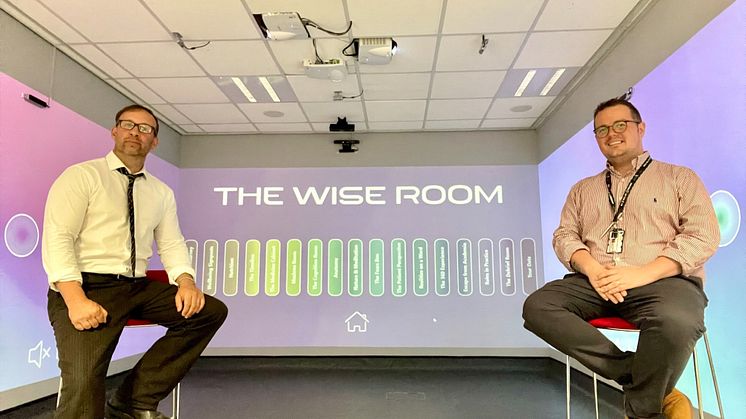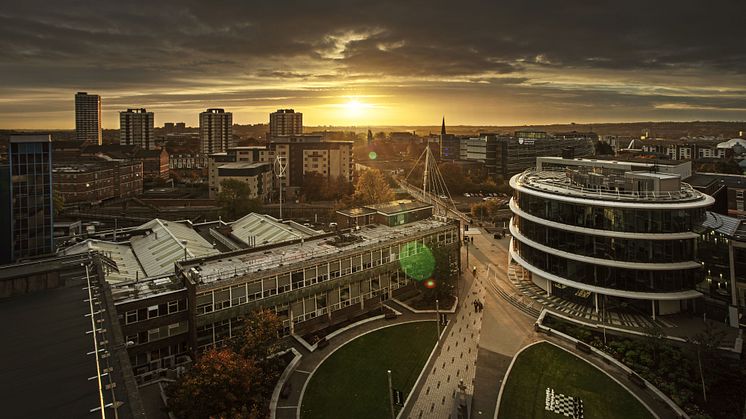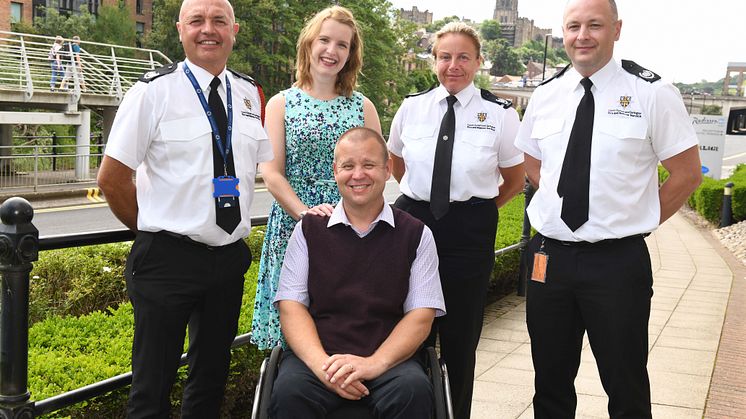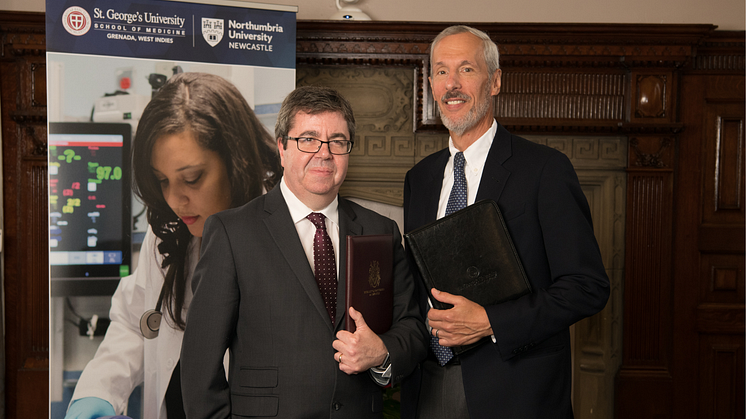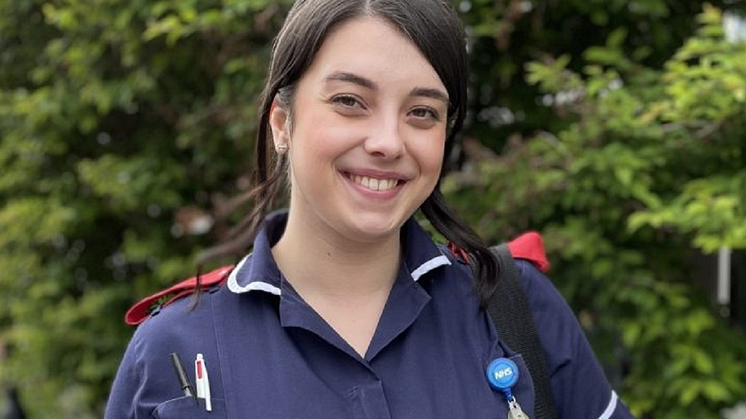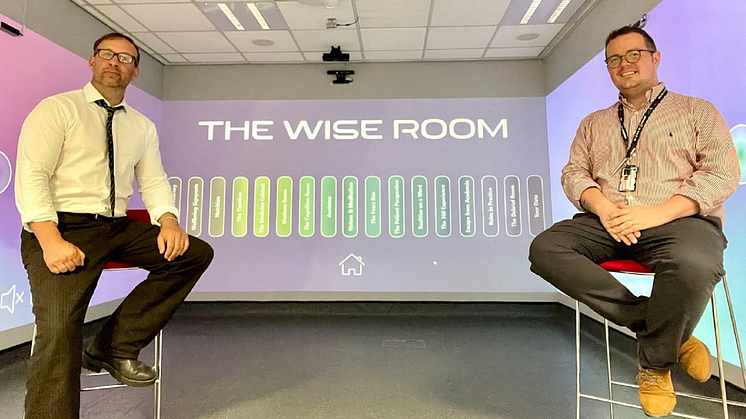
Press release -
Digital environment to support student wellbeing secures NHS funding
An academic team from Northumbria University has obtained a grant of £40,000 to establish a pioneering immersive wellbeing environment for students – an initiative with potential for nationwide roll-out.
The proposal was submitted by Associate Professor Barry Hill together with Dr Tor Alexander Bruce who is leading on the project, supported by Principal Investigator, Assistant Professor Dr Deborah Flynn and Co-investigator, Assistant Professor Dominique Simpson.
Dr Bruce and Associate Professor Hill, who between them have extensive experience of immersive digital environments, trauma, and nursing, have used the funding from NHS England to design a space that enables health and life science students at the University’s Coach Lane Campus in Newcastle upon Tyne to learn and relax in a calm, interactive environment.
The first experiential space of its kind, The Wellbeing in Student Education, or WISE Room, is already being developed to support other areas of the University and the concept behind it could eventually be rolled out in other working environments across the country.
The WISE Room contains auditory experiences, videos and images, and incorporates advanced features combining artificial intelligence (AI) with a human-centred design focus. It is also a multi-technology platform where students can interact inside it or remotely with their phones, laptops or in certain rooms via a head-mounted device. The menu of items enables students to learn about everything from nutrition to specific medicines or general wellbeing – all in an interactive way.
Dr Bruce, an interdisciplinary researcher specialising in health and life sciences, human computer interaction and human-centred design, said his background of working in the charity sector was an influence in developing the new technology. “This is a novel, exciting project that has been influenced by previous practice,” he said. “I ran a charity for 12 years working with young people who’d had adverse life experiences. I discovered that trauma in the body can be released by moving around and interacting with the environment.
“I took this forward in my PhD in the field of human computer interaction where I designed, trialled and evaluated a digital therapeutic intervention called The Timeline – effectively, a multi-sensory environment that contains still and moving image displays, as well as sounds and the ability to engage via touch.”
Dr Bruce collaborated with Associate Professor Hill, from the University's Department of Nursing, Midwifery, and Health. They contemplated how they could utilise the technology to assist students who might have been considering withdrawing from their course. This is the second NHS England project, succeeding a student attrition initiative last summer, led by Associate Professor Hill and Assistant Professor Dr Annessa Rebair, which also secured a £40,000 grant.
“The University already offers a range of pastoral support for students and staff, but The WISE Room adds a different dimension where students can engage experientially with their surroundings,” said Dr Bruce. “This draws on theory from embodied and enactive cognition, whereby people make sense of their environment by engaging with it.
“The set up of these types of digital environments permits a level of autonomy for users in that they can access The WISE Room as a tool, for course preparation, self-direction, education and also for wellbeing. In this sense it’s a multisensory, multipurpose, multi-technology environment and can be accessed via a range of devices.”
Now the academics are exploring ways of linking the concepts behind The WISE Room to other faculties and areas of expertise across Northumbria University.
Associate Professor Hill added: “Although our primary objective was to design a system to lower attrition rates among undergraduate students in our nursing, midwifery and health programmes, the initiative has now flourished into a robust, interdepartmental research project, characterised by substantial collaboration among students, staff and external partners.
“This project is pioneering in its nature. We’re excited to be developing what could be the first experiential system of its kind—possibly on a national scale—which allows students to engage directly and meaningfully with their wellbeing support network.
“More generally, the project raises questions about how future digital environments, technology applications and tools can influence how people interact in the workplace, particularly in the field of digital healthcare.”
Sasha Ban, Assistant Professor of Nursing and Deputy Head of the Department of Nursing, Midwifery and Health at Northumbria University, said: “We are delighted to support and host this initiative within our state-of-the-art Clinical Skills Centre at Coach Lane Campus. The development team are visionary and have created an environment that supports wellbeing which promotes resilience in our healthcare student community.”
Eleanor Coleman, Project Manager for the Nursing and Midwifery Team in NHS England’s Workforce, Training and Education directorate, said: “We were pleased to be able to fund such a useful and innovative project at Northumbria University to support undergraduate students at risk of leaving the programme.”
Northumbria’s Department of Nursing, Midwifery and Health offers students the opportunity to develop caring careers that can transform the lives of patients, families and communities.
For more information about facilities and study options for healthcare courses at Northumbria, visit www.northumbria.ac.uk/nmh
Topics
Categories
UNIVERSITY OF THE YEAR 2022 (Times Higher Education Awards)
Northumbria is a research-intensive university that unlocks potential for all, changing lives regionally, nationally and internationally. Find out more about us at www.northumbria.ac.uk
--- Please contact media.communications@northumbria.ac.uk with any media enquiries or interview requests ---







